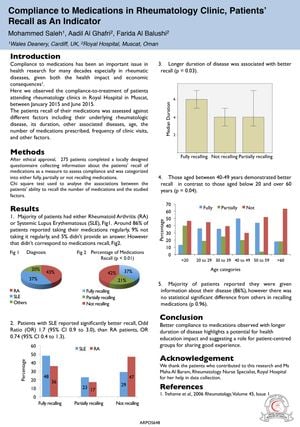Compliance to Medications in Rheumatology Clinic: The Patient Recall as an Indicator
February 2018

TLDR Many patients in the rheumatology clinic adjusted or stopped their medications due to side effects.
The document analyzed patient compliance with medications in a rheumatology clinic, using patient recall as an indicator. It reported various side effects experienced by patients, including gastrointestinal issues (69%), central nervous system effects (6%), neutropenia (3%), oral ulcers (3%), allergies (6%), hepatotoxicity (1%), and hair loss (9%). The study involved 32 patients, with 25% modifying their dose, 28% shifting to subcutaneous injections, 25% switching to other DMARDs, 19% moving to anti-TNF/Rituximab treatments, and 3% stopping the medication altogether.


